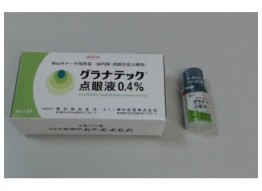What are Mercazole tablets (thiamazole, methimazole) 5 mg for hyperthyroidism?
An active principle of Mercazole tablets is thiamazole, also called methimazole. It blocks the activity of thyroperoxidase enzyme and, by this, acts on the thyroid gland to inhibit thyroid hormone synthesis. Mercazole tablets are effective for the treatment of hyperthyroidism, including Graves disease, toxic multinodular gouter, and thyrotoxic crises. This medicine reduces thyroid hormone secretion but does not affect the sodium-dependent iodide transporter, which is located on the basolateral membranes of follicular cells.
Mercazole tablets are suitable for adults and children from 5 years old. This medicine can be used as a primary treatment for hyperthyroidism, or concomitantly with radioiodine therapy.
Active principles: thiamazole
Amount: 100 tablets
Maker: ASKA Pharmaceutical Co., Ltd., Tokyo, Japan
Indications: lowering the thyroid function in patients suffering from hyperthyroidism, including:
- Graves disease,
- toxic multunodular goiter,
- thyrotoxic crises.
How to take
Adults: take 2 tablets 3 times a day. Your doctor should reduce the dosage gradually every 1-4 weeks to maintain hyperthyroid symptoms.
Adults with severe hyperthyroidism: take 8-12 tablets a day, dividing into 3-4 times. Your doctor should reduce the dose every 1-4 weeks to maintain hyperthyroid symptoms.
Children of 5-10 years old: take 2-4 tablets a day, dividing into several times. Your doctor should reduce the dosage gradually every 1-4 weeks to maintain hyperthyroid symptoms.
Children of 10 and 15 years old: take 4-6 tablets a day in divided doses of 2-4 tablets each. Your doctor should reduce the dosage gradually every 1-4 weeks to maintain hyperthyroid symptoms.
Pregnant women: take 3-6 tablets a day dividing into 3-4 times. Your doctor should reduce the dose every 1-4 weeks to maintain hyperthyroid symptoms. The thyroid function level of the patient should not be lower than it is during normal pregnancy. Pregnant patient should have a test every two weeks and should take as little medicine as possible.
The treatment should always be under the monitoring of your doctor. Your doctor may adjust the dose according to your age and symptoms.
Contraindications: do not use for the following patients:
- breastfeeding women,
- patients with liver dysfunction,
- patients with leukopenia,
- patients with other blood disorders.
Pregnant women may be prescribed to take this medicine only if the therapeutic benefits are judged to outweigh the risks. Administration during pregnancy may affect the fetus, including scalp/cranial defects, umbilical hernia, atresia, suppressed thyroid function etc. When administering to pregnant women, thyroid function tests should be performed regularly and the dosage should be adjusted to appropriately maintain thyroid function. Suppressed thyroid function and hyperthyroidism may appear in newborns for some time after birth.
Important information
In order to avoid the occurrence of agranulocytosis, blood tests including leukocyte fractionation should be performed once every two weeks for at least 2 months after the start of administration, and periodically thereafter.
If an allergic reaction occurs, patient needs to stop using the medicine and consult with their doctor. If patient is taking any other medication or treatment, they should consult with their doctor in advance.



